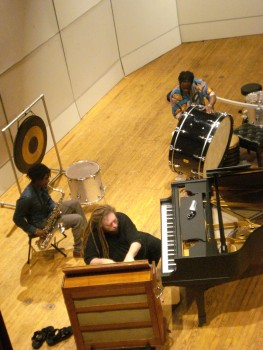New Tri-College Creative Arts Residencies Program to Launch

The Sound of Sci(l)ence event, in 2009, featured a jazz improvisation by Will Calhoun (drums), Jaron Lanier (piano) and Haverford physics professor Stephon Alexander (saxophone).
Details
The Andrew W. Mellon Foundation has awarded Haverford, Bryn Mawr and Swarthmore a $739,000 grant to develop a Tri-College Creative Arts Residencies Program. The new initiative, which will focus on creating arts residencies linked to faculty and departments not traditionally associated with the arts, will be administered by Haverford's John B. Hurford '60 Humanities Center (HHC).
The funding for the Tri-College program came after three years of work by the Humanities Center, which received an $87,700 planning grant from the Mellon Foundation in 2007. That initial funding turned Haverford into a test lab for creative arts residencies that connect directly with students, faculty scholarship, existing courses and the wider intellectual landscape of the campus.
Among the arts-related residencies that took place during this period was a three-day series of conversations, workshops, and performances exploring the intersection of music and quantum mechanics. Organized by Assistant Professor of Chemistry Joshua Schrier and Associate Professor of Physics Stephon Alexander, the 2009 Sounds of Sci(l)ence event brought to campus DJ Spooky, percussionist Will Calhoun (of the band Living Colour) and virtual-reality guru Jaron Lanier. The planning grant also brought a concert pianist into the classroom of Assistant Professor of Sociology Lisa McCormick, whose scholarship focuses on cultural sociology; allowed Assistant Professor of Anthropology Jesse Shipley to organize“Politics, Africa and Performance,” which brought African writers, performers and activists to Haverford to discuss the potential of art to impact politics; and funded a visit by poet and playwright Claudia Rakine, who collaborated with Assistant Professor of History Andrew Friedman on a public reading of her new play and a series of experimental workshop-conversations exploring“Location and Memoir.”
Other recent projects have included“In/Visible,” a symposium focusing on disability and the arts, as well as“The Marriage of True Minds,” a workshop with electronic musicians and Björk-collaborators Matmos linked to the English Department.
“The Mellon funding is a real vote of confidence,” says Israel Burshatin, director of the Hurford Humanities Center and Levin Professor of Comparative Literature and Spanish, who credits HHC Associate Director James Weissinger '06 with helping faculty pull together these innovative arts residencies. “But making this a Tri-Co program is really upping the ante.”
“Over the past nine years, I've seen the arts completely explode—in a good way— at Haverford,” says Weissinger, who points to the active student art space James House, exhibits organized by the Drop Shot student collective (in a repurposed racquetball court in the basement of the old Ryan Gym), and exhibitions events organized by installation artist, comparative literature scholar and HHC faculty liaison John Muse.“Every day I get three emails from students and faculty about new ideas the Humanities Center should support," Weissinger says. "And having three separate groups of students applying for grants to stage experimental sound installations is the best kind of problem to have. Basically, there's a huge amount of creativity among students, faculty, and staff across the three academic divisions right now, and I think the residencies program will be a great resource for the whole College.”
“This is a more collaborative venture than the usual,” says Burshatin, who utilized the Mellon planning grant to organize a symposium that brought in four curators from diverse institutions to present their views on curatorial practice.“While the Tri-Co aspect does not have to be there for every event, the idea for the program is to have as many opportunities as possible for interaction between the artists, students and faculty. The model allows for events to take place on each campus and for collaborations to take place on two campuses. In some instances the collaboration might be among the three campuses—which would be great. But it is not required.”
The next steps for Burshatin and the HHC staff include working with Bryn Mawr and Swarthmore in the coming year to set up the new Creative Arts Residencies Program, and hire a grant-funded full-time program coordinator who will be based at the Humanities Center.
--Eils Lotozo



